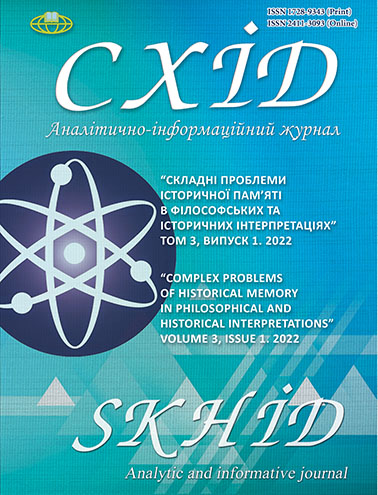Traditionalist aspect of sociocultural practices: historical memory in the conditions of information war
DOI:
https://doi.org/10.21847/1728-9343.2022.3(1).271320Keywords:
traditionalism, modernism, worldview, historical memory, sociocultural practices, tradition, cultureAbstract
The article aims to study the role of philosophical traditionalist concepts in socio-cultural practices and the development of historical memory. Historical memory is proven to be a tool for transferring social experience, as well as scientific and non-scientific knowledge about the shared past and an entire system of self-identification of society. At the same time, historical memory is a dimension of the individual and collective memory of the historical past, representing it from a symbolic perspective. As a sociocultural phenomenon, historical memory accumulates a set of images and collective perceptions, reproducing the community's cultural and historical experience. The nature of society implies that previous socio-historical stages are causally related to the present. The current historical period forms the basis of the future. The connection of the present with the past is the basis of tradition. Cognition of traditional symbols is performed with the help of a particular "symbolic method" of analogies. The superhuman in tradition is revealed in the direct experience of the sacred, after which the transcendental realm begins. Attributing to tradition a metaphysical, not just socio-cultural status, traditionalists are guided by the existential integrity of human existence in the system of the tradition, the interconnection of all its manifestations, and the connection between the revealed and unrevealed levels of reality.
Downloads
References
Abushenko, V.L. (2003). Traditsiya. In: Noveyshiy filosofskiy slovar': Issue 3. Minsk, Knizhnyy Dom, P. 1047 (In Russian).
Assman, Y. (2004). Kulturnaja pamjat: Pismo, pamjat o proshlom i politicheskaja identichnost v vysokih kulturah drevnosti. [Cultural memory: a letter, a memory of the past and political identity in the high cultures of antiquity]. Moscow, 368 p. (In Russian).
Foucault, M. (1997). Istoriya bezumiya v klassicheskuyu epokhu. St.Petersburg, 576 p.
Hnatyuk, O. (2005). Proshchannya z imperiyeyu: Ukrayinski dyskusiyi pro identychnist. Kyiv, Krytyka, 528 p. (In Ukrainian)
Hobsbawm, Eric (ed.) and Ranger, Terence (ed.) (2005). Vynaydennya tradytsiyi [The Invention of Tradition] (Transl.from Engl.). Кyiv, Nika-Centr, 448 p. (In Ukrainian)
Kovalskyi, H.Ye. (2015a). Tradytsionalistskyy konstrukt ukrayinskoho sotsiumu. Donetsk-Vinnytsya, 147 p. (In Ukrainian)
Kovalskyi, H.Ye. (2015b). Tradytsionalistychna kontseptsiya Yu.Lypy. Nauka. Relihiya. Suspilstvo, # 1, 36–39 (In Ukrainian).
Sheyko, O.S. (2001). Tradytsiya yak faktor samorozvytku suspilstva. Zaporizhzhya (In Ukrainian)
Shils, Edward Albert (1998). O soderzhanii termina “traditsiya” (pp. 240-245). In: B.S. Yerasov (comp.and ed.). Sravnitelnoye izucheniye tsivilizatsiy. Khrestomatiya. Moscow, Aspekt Press. (In Russian)
Sztompka, P. (1996). Sotsiologiya sotsialnykh izmeneniy. Moscow, Aspekt Press, 416 p. (In Russian)
Downloads
Published
How to Cite
Issue
Section
License
Copyright (c) 2023 Григорій Ковальський

This work is licensed under a Creative Commons Attribution-NonCommercial-NoDerivatives 4.0 International License.
1. Authors bear responsibility for the accuracy of facts, quotations, numbers and names used.
2. Manuscripts are not sent back.
3. The publisher does not always agree with the authors' opinion.
4. The authors reserve the right to authorship of the work and pass the first publication right of this work to the journal under the terms of a Creative Commons Attribution-NonCommercial-NoDerivatives 4.0 International License. This license allows others to distribute (copy) the published work for non-commercial purposes, provided there is mandatory attribution to its authors and a link to the first publication in our journal.
5. The authors have the right to conclude separate supplement agreements that relate to non-exclusive work distribution in the form in which it has been published by the journal (for example, to upload the work to the online storage of the journal or publish it as part of a monograph), provided that the reference to the first publication of the work in this journal is included.

